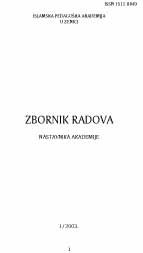DRUŠTVENO-POLITIČKI UVJETI POSTANKA DIJALEKATA, PODJELE I OSNOVNA JEZIČKA OBILJEŽJA
SOCIAL-POLITICAL CONDITIONS FOR EMERGENCE OF DIALECTS, DIVISIONS AND BASIC LINGUISTIC CHARACTERISTICS
Author(s): Mejra SoftićSubject(s): Education
Published by: Islamski pedagoški fakultet Univerziteta u Zenici
Summary/Abstract: Studying of dialects takes an important place in Arabic linguistics. It is a significant fact from two aspects: First – For a long time dialects were considered “spoiled” variants of literary language and therefore serious discussions about them were avoided. Second – Such opinion was finally overcome and because dialects are means of everyday communication specific for each country and even for particular areas within a dialect, they really deserve to be scientifically studied. Studying of old and contemporary dialects is equally important and conditioned by their mutual language features. Apart from their huge versatility, which is, according to many philologists, reflected in different pronunciation and vocabulary, all dialects basically have something that unifies them and makes them mutually understandable and that is the structure of a language. Gradual development and prominence of certain dialects like Egyptian, Tunisian or Syrian, points out a necessity of overcoming a deep gap between dialects and literary language. There are some predictions that in the future these dialects will either possibly become standard language forms or the literary language (as requested by Taha Husayn) will have to be simplified and thus accessible to everybody in Arabic world. In any case, linguists will soon have a very significant role in finding solutions for that very complicated problem which could imply some inevitable political connotations.
Journal: Zbornik radova Islamskog pedagoškog fakulteta u Zenici
- Issue Year: 2003
- Issue No: 01
- Page Range: 194-209
- Page Count: 16
- Language: Bosnian

